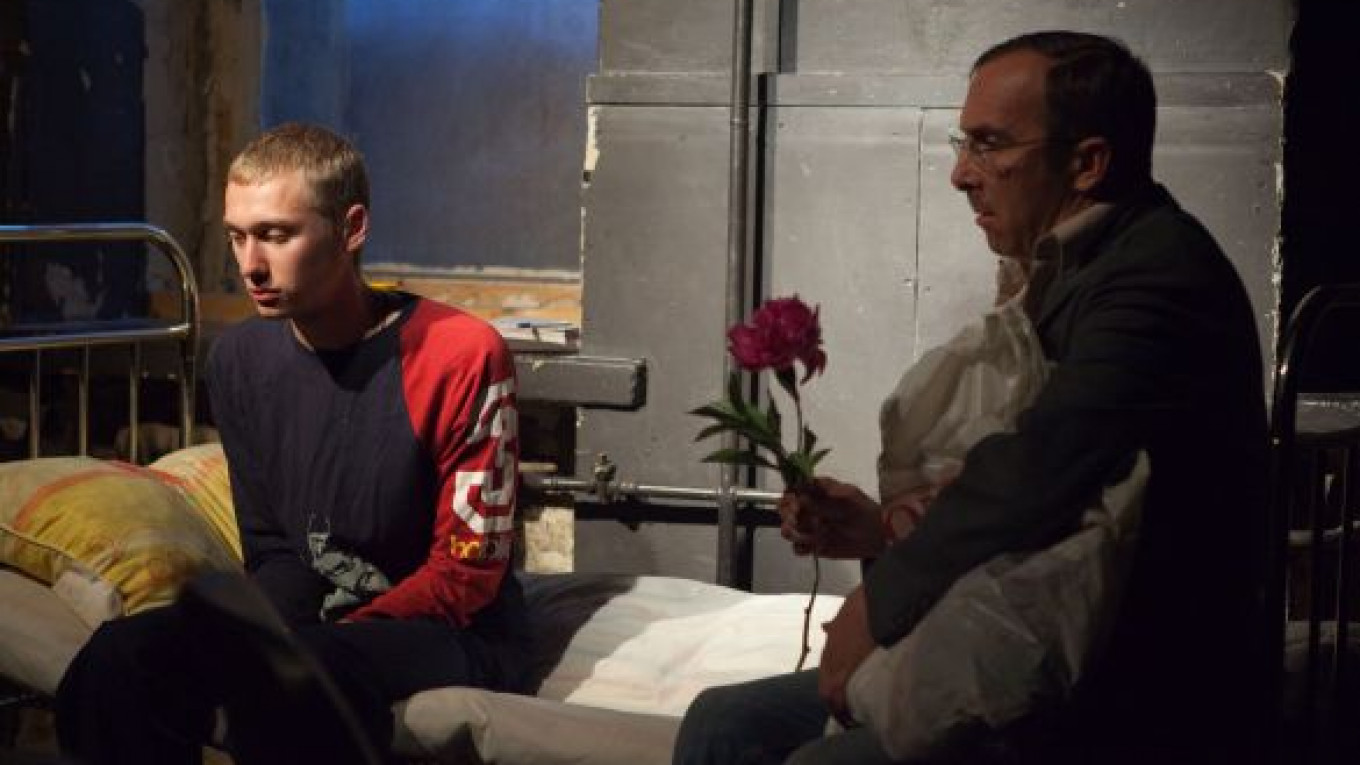Teatr.doc turned its stages over to a full seven days of performances and readings of new plays last week. In part it was a summing up of the season that is now coming to an end. In part it was a gearing up for next season, which begins in September.
As is customary at this venue, which works primarily with texts drawn from real life experiences, the plays on tap for next year will touch on such topics as terrorism, life in rural settings, political murder and experiences in a morgue. This season’s crop of so-called documentary plays included explorations of alcoholism (“Alconovellas”), Moscow artists squatting in abandoned buildings in the early post-Perestroika years (“89-93. Squatters”), a Belarussian poet and politician confined to house arrest (“Two in Your Home”), and others.
One show, “Noise,” featured a double debut, with Talgat Batalov and Yekaterina Bondarenko making their first outings as director and playwright, respectively. Neither shied away from a hard story.
“Noise” examines a true incident, in which a teenage boy in the Russian provinces shot dead a friend for drawing a black dot on his nose. It is a squalid, mixed-up, sad and maddening tale.
Bondarenko formally broke her play into a series of episodes showing various people discussing the event. Some appear by way of video recordings, others are played by live actors on stage. The two pillars holding the story up are the journalist Vasily (Mikhail Rudenko), who wants to discover what really went down that day, and the killer himself, Ivan (Alexei Maslodudov), who is now in a psychiatric ward for criminal youths.
Ivan is a thoughtful, confused and, quite probably, sick young man. His speech patterns and mannerisms clearly give him away as an individual who is only tentatively in touch with reason. His smart, active mind often leads him to make odd or disconcerting conclusions about himself and the world.
Ivan’s father (Vladimir Tereshchenko) is also a thoughtful man, meek in some ways, though strong in his resolve to understand his son.
The conversations that the father conducts with the son reveal someone who believes there is a rational explanation for what has transpired. He thinks that by loving his son, supporting him and leading him into talk about morality, family and responsibility, he can make sense of the tragedy.
That may be touching, but when all is said and done, Ivan declares that everyone is “asking the wrong questions.”
The mess of the social milieu in which Ivan grew up is clear from the beginning. The journalist plies Ivan’s friend (Sergei Ovchinnikov) with beer and vodka in hopes that he might reveal some insights. All the youth does, of course, is descend into belligerence and incoherence the more they talk and drink.
A picture emerges of a dirty, backward town in which even intelligent people hold odd, if not downright ignorant, opinions. This becomes clear during a conversation between the journalist and Ivan’s father, when the latter admits to believing that the only way to put his town right is to eradicate it entirely.
This is all daunting, gruesome and thought provoking. It is not, however, always convincing as theater.
Bondarenko supplies strong indications that the impulses making a murderer of Ivan were social. And yet the character is written and acted as if he has serious psychological flaws that surely would have caused problems no matter what his environment.
Is this, then, a story about a clinical illness or a breakdown in the social fabric? “Noise,” which refers as much to the distracting noises one hears in the head as to anything heard on the street, doesn’t so much answer the question as muddy it.
Batalov’s alternating use of video interviews interspersed with scenes performed live is an attempt to impart movement to the talky play, but this doesn’t always pay off. In the dark dungeon that is Teatr.doc the play runs long even though its performance time is remarkably short at one hour and 15 minutes.
But for those who know Teatr.doc, this is what you get — adventurous artists taking on difficult topics. If stories of crime, misery and corruption have become something of a cliché at this venue, the sincerity behind the telling of the tales is never that. And in a society where, aside from the Internet, there are precious few places to go for an honest look at contemporary life, Teatr.doc remains a mecca for the politically astute and socially engaged.
For more information about Teatr.doc go to . Some shows continue to play through July 11. Next season kicks off the second week of September with the Lyubimovka play festival.
A Message from The Moscow Times:
Dear readers,
We are facing unprecedented challenges. Russia's Prosecutor General's Office has designated The Moscow Times as an "undesirable" organization, criminalizing our work and putting our staff at risk of prosecution. This follows our earlier unjust labeling as a "foreign agent."
These actions are direct attempts to silence independent journalism in Russia. The authorities claim our work "discredits the decisions of the Russian leadership." We see things differently: we strive to provide accurate, unbiased reporting on Russia.
We, the journalists of The Moscow Times, refuse to be silenced. But to continue our work, we need your help.
Your support, no matter how small, makes a world of difference. If you can, please support us monthly starting from just $2. It's quick to set up, and every contribution makes a significant impact.
By supporting The Moscow Times, you're defending open, independent journalism in the face of repression. Thank you for standing with us.
Remind me later.







